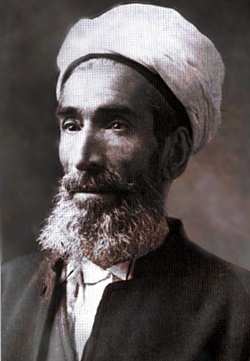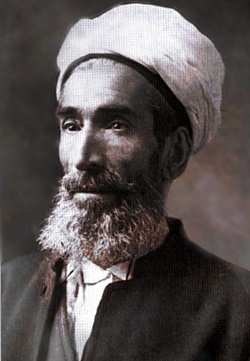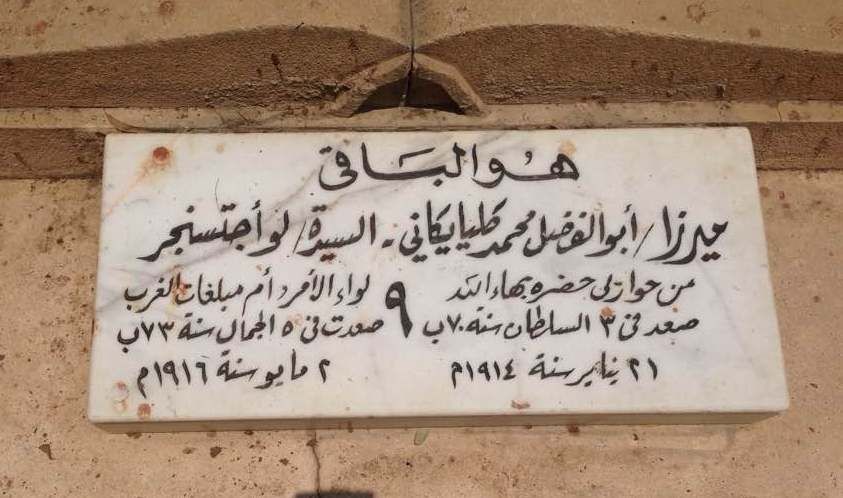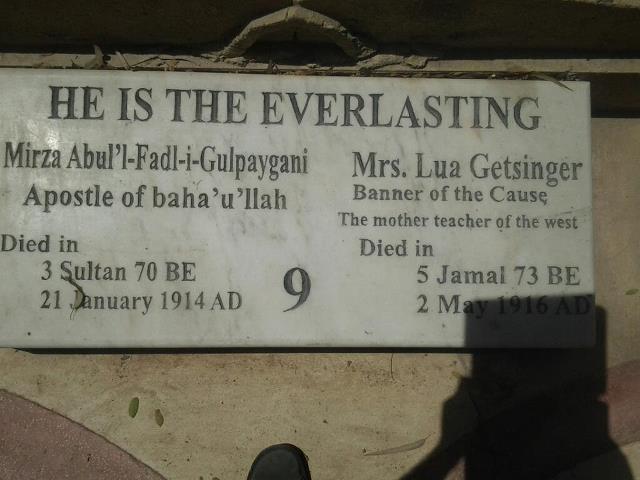Mírzá Muḥammad (Persian: ميرزا أبوالفضل), or Mírzá Abu'l-Faḍl-i-Gulpáygání (1844–1914) was the foremost Bahá'í scholar who helped spread the Bahá'í Faith in Egypt, Turkmenistan, and the United States. He is one of the few Apostles of Bahá'u'lláh who never actually met Bahá'u'lláh. His given name was Muhammad, and he chose the alias Abu'l-Fadl (progenitor of virtue) for himself, but `Abdu'l-Bahá frequently addressed him as Abu'l-Fada'il (progenitor of virtues).
His books and writings are still studied today:
Sharh-i-Ayat-i-Mu'arrakhih (In Explanation of Massacre Verses that Prophesy Dates): Written in 1888, the work discusses the date of the prophecies concerning the coming of the Promised One in the scriptures of Islam, Christianity, Judaism, and Zoroastrianism.
Risalih Ayyubiyyih (Treatise addressed to Ayyub): Written in 1887, concerning prophecies relating to the Promised One in the Torah.
Faslu'l-Khitab (The Decisive Utterance): A large book written in Samarqand in 1892; among its subjects, it discusses the traditions in Shia Islam regarding the persecution of the Promised One. The book was written in reply to an attack by an Adharbayjan Shia cleric. No known copy of the work exists.
Sharh-i-Ayat-i-Mu'arrakhih (In Explanation of Massacre Verses that Prophesy Dates): Written in 1888, the work discusses the date of the prophecies concerning the coming of the Promised One in the scriptures of Islam, Christianity, Judaism, and Zoroastrianism.
Risalih Ayyubiyyih (Treatise addressed to Ayyub): Written in 1887, concerning prophecies relating to the Promised One in the Torah.
Faslu'l-Khitab (The Decisive Utterance): A large book written in Samarqand in 1892; among its subjects, it discusses the traditions in Shia Islam regarding the persecution of the Promised One.
Fara'id (The Peerless Gems): A book written in 1898 in reply to an attack on the Kitáb-i-Íqán and published in Cairo.
Al-Duraru'l-Bahiyyih (The Shining Pearls): Published in 1900, it is a collection of essays on the history of the Bahá'í Faith.
Risaliyyih Iskandaraniyyih: Published along with Al-Duraru'l-Bahiyyih, the paper provides proofs for Muhammad's prophethood from Christian and Jewish scripture.
Al-Hujaju'l-Bahá'íyyih (The Bahá'í Proofs): A book written while in the United States, which explains and defends the Bahá'í Faith from a Christian point of view.
Burhan-i-Lami` (The Brilliant Proof): Published, along with an English translation, in Chicago in 1912, the paper responds to a Christian clergyman's questions. Republished as Mírzá Abu'l-Fadl Gulpáygání (1998), The Brilliant Proof, Los Angeles: Kalimát Press
Between 1900 and 1904 he travelled to Paris and the United States, by request of `Abdu'l-Bahá, where his talks and writings enabled the fledgling Bahá'í communities to gain confidence and a clear understanding of the religion. During his travels, he was accompanied by Laura Clifford Barney, an American Bahá'í. In Paris, his talks were translated by Anton Haddad, and over thirty people became Bahá'ís. Then in the autumn of 1901 travelled to the United States, and specifically to Chicago, where the largest Bahá'í community was, and gave a large number of talks. Then in December 1901, Abu'l-Fadl travelled to Washington D.C. and gave talks to both Bahá'ís and the general population. During this time, he also continuously worked on an introductory book on the Bahá'í Faith.[1]
Abu'l-Fadl then travelled to the Green Acre Bahá'í School in Eliot, Maine where he stayed during the months of July and August 1903 and lectured to a Bahá'í audience. In 1904, `Abdu'l-Bahá asked that Abu'l-Fadl return to the Middle East, and the Bahá'ís held a large farewell gathering for him in New York on 29 November 1904.
Shoghi Effendi: God Passes By
It was to the first of these two officially designated Baha'i cemeteries, following the decision of the Egyptian Baha'i National Assembly aided by its sister- Assembly in Persia, that the remains of the illustrious Mirza Abu'l- Fadl were transferred and accorded a sepulture worthy of his high position, thereby inaugurating, in a befitting manner, the first official Baha'i institution of its kind established in the East. This achievement was, soon after, enhanced by the exhumation from a Christian cemetery in Cairo of the body of that far- famed mother teacher of the West, Mrs. E. Getsinger, and its interment, through the assistance extended by the American Baha'i National Assembly and the Department of State in Washington, in a spot in the heart of that cemetery and adjoining the resting- place of that distinguished author and champion of the Faith. (368:3)
Mírzá Muḥammad (Persian: ميرزا أبوالفضل), or Mírzá Abu'l-Faḍl-i-Gulpáygání (1844–1914) was the foremost Bahá'í scholar who helped spread the Bahá'í Faith in Egypt, Turkmenistan, and the United States. He is one of the few Apostles of Bahá'u'lláh who never actually met Bahá'u'lláh. His given name was Muhammad, and he chose the alias Abu'l-Fadl (progenitor of virtue) for himself, but `Abdu'l-Bahá frequently addressed him as Abu'l-Fada'il (progenitor of virtues).
His books and writings are still studied today:
Sharh-i-Ayat-i-Mu'arrakhih (In Explanation of Massacre Verses that Prophesy Dates): Written in 1888, the work discusses the date of the prophecies concerning the coming of the Promised One in the scriptures of Islam, Christianity, Judaism, and Zoroastrianism.
Risalih Ayyubiyyih (Treatise addressed to Ayyub): Written in 1887, concerning prophecies relating to the Promised One in the Torah.
Faslu'l-Khitab (The Decisive Utterance): A large book written in Samarqand in 1892; among its subjects, it discusses the traditions in Shia Islam regarding the persecution of the Promised One. The book was written in reply to an attack by an Adharbayjan Shia cleric. No known copy of the work exists.
Sharh-i-Ayat-i-Mu'arrakhih (In Explanation of Massacre Verses that Prophesy Dates): Written in 1888, the work discusses the date of the prophecies concerning the coming of the Promised One in the scriptures of Islam, Christianity, Judaism, and Zoroastrianism.
Risalih Ayyubiyyih (Treatise addressed to Ayyub): Written in 1887, concerning prophecies relating to the Promised One in the Torah.
Faslu'l-Khitab (The Decisive Utterance): A large book written in Samarqand in 1892; among its subjects, it discusses the traditions in Shia Islam regarding the persecution of the Promised One.
Fara'id (The Peerless Gems): A book written in 1898 in reply to an attack on the Kitáb-i-Íqán and published in Cairo.
Al-Duraru'l-Bahiyyih (The Shining Pearls): Published in 1900, it is a collection of essays on the history of the Bahá'í Faith.
Risaliyyih Iskandaraniyyih: Published along with Al-Duraru'l-Bahiyyih, the paper provides proofs for Muhammad's prophethood from Christian and Jewish scripture.
Al-Hujaju'l-Bahá'íyyih (The Bahá'í Proofs): A book written while in the United States, which explains and defends the Bahá'í Faith from a Christian point of view.
Burhan-i-Lami` (The Brilliant Proof): Published, along with an English translation, in Chicago in 1912, the paper responds to a Christian clergyman's questions. Republished as Mírzá Abu'l-Fadl Gulpáygání (1998), The Brilliant Proof, Los Angeles: Kalimát Press
Between 1900 and 1904 he travelled to Paris and the United States, by request of `Abdu'l-Bahá, where his talks and writings enabled the fledgling Bahá'í communities to gain confidence and a clear understanding of the religion. During his travels, he was accompanied by Laura Clifford Barney, an American Bahá'í. In Paris, his talks were translated by Anton Haddad, and over thirty people became Bahá'ís. Then in the autumn of 1901 travelled to the United States, and specifically to Chicago, where the largest Bahá'í community was, and gave a large number of talks. Then in December 1901, Abu'l-Fadl travelled to Washington D.C. and gave talks to both Bahá'ís and the general population. During this time, he also continuously worked on an introductory book on the Bahá'í Faith.[1]
Abu'l-Fadl then travelled to the Green Acre Bahá'í School in Eliot, Maine where he stayed during the months of July and August 1903 and lectured to a Bahá'í audience. In 1904, `Abdu'l-Bahá asked that Abu'l-Fadl return to the Middle East, and the Bahá'ís held a large farewell gathering for him in New York on 29 November 1904.
Shoghi Effendi: God Passes By
It was to the first of these two officially designated Baha'i cemeteries, following the decision of the Egyptian Baha'i National Assembly aided by its sister- Assembly in Persia, that the remains of the illustrious Mirza Abu'l- Fadl were transferred and accorded a sepulture worthy of his high position, thereby inaugurating, in a befitting manner, the first official Baha'i institution of its kind established in the East. This achievement was, soon after, enhanced by the exhumation from a Christian cemetery in Cairo of the body of that far- famed mother teacher of the West, Mrs. E. Getsinger, and its interment, through the assistance extended by the American Baha'i National Assembly and the Department of State in Washington, in a spot in the heart of that cemetery and adjoining the resting- place of that distinguished author and champion of the Faith. (368:3)





